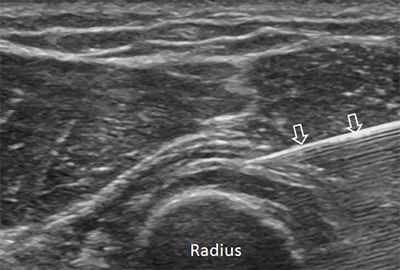Ultrasound image showing a hydrodissection procedure for posterior interosseous nerve entrapment, as the nerve passes between the heads of the supinator muscle in the forearm.
Ultrasound guided hydrodissection is a new method of treatment of entraped nerves. Entrapment neuropathy of peripheral nerves is common, but often is under-recognized as a source of pain.
Nerves are supposed to glide smoothly around surrounding tissue, but entrapped nerves can be stuck or adhered to the surrounding tissue. This scar tissue can cause pain.
Nerves can also be compressed by trauma, scar tissue from surgery, or surrounding anatomic structures. Symptoms can range from mild discomfort to numbness, paralysis or pain.
Nerve hydrodissection can be an alternative to an open surgery for some people. Using ultrasound guidance, Dr. Sussman identifies the nerves and guides the needle next to the nerve. Once the needle tip nears the nerve, fluid is injected around the nerve to free the nerve from surrounding tissues. This can have the same effect as a surgical release, with resolution of the numbness, tingling and pain.
Neural therapy was first described in medical journals in 1989, and is used to treat pain coming from scars.
Small terminal branches of cutaneous nerves can sometimes be scarred down or tethered to the skin and underlying fascia.
If you have pain when touching your surgical scar this technique may offer relief to a group of patients who have not found relief elsewhere.

Nerve entrapment can affect any peripheral nerves. Common conditions include:
Nerve hydrodissection uses fluid to release the nerve from the surrounding muscle or scar tissue. The nerve is first identified with ultrasound, and a solution of normal saline is gently placed around the entrapped nerve using ultrasound guidance. The solution releases the nerve from the surrounding tissue that is compressing the nerve.
Sometimes only one treatment is needed, but often the procedure needs to be repeated. Up to 3-6 treatments are needed in some cases.
In some cases surgery is needed to prevent nerve damage. However, these treatments can save some people from needing surgery for conditions such as carpal tunnel syndrome (CTS) and other nerve entrapment syndromes. The procedures takes only minutes, requires no downtime, and does not pose the same risks as surgery.
If the fear of surgery has prevented you from seeking help, please know that non-surgical treatment options may exist!
Boston Sports & Biologics specializes in minimally invasive procedures and orthobiologics, and is one of only a handful of clinics in New England that Is accredited by the the American Institute of Ultrasound Medicine (AIUM) in diagnostic ultrasound and ultrasound guided procedures. AIUM ultrasound practice accreditation is a voluntary peer review process that allows practices to demonstrate that they meet or exceed nationally recognized standards in the performance and interpretation of diagnostic ultrasound examinations.